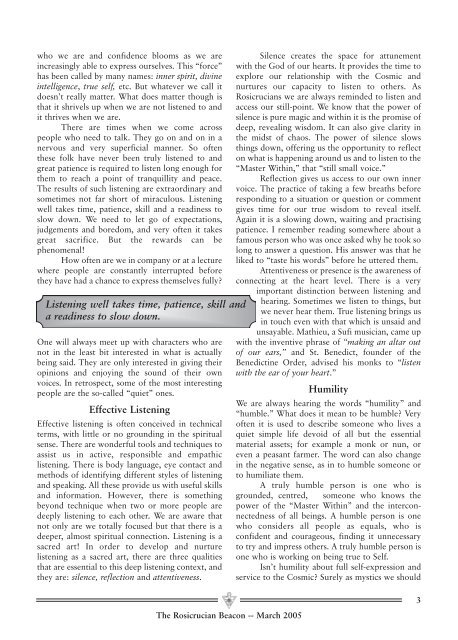The Rosicrucian Creed - AMORC
The Rosicrucian Creed - AMORC
The Rosicrucian Creed - AMORC
You also want an ePaper? Increase the reach of your titles
YUMPU automatically turns print PDFs into web optimized ePapers that Google loves.
who we are and confidence blooms as we are<br />
increasingly able to express ourselves. This “force”<br />
has been called by many names: inner spirit, divine<br />
intelligence, true self, etc. But whatever we call it<br />
doesn’t really matter. What does matter though is<br />
that it shrivels up when we are not listened to and<br />
it thrives when we are.<br />
<strong>The</strong>re are times when we come across<br />
people who need to talk. <strong>The</strong>y go on and on in a<br />
nervous and very superficial manner. So often<br />
these folk have never been truly listened to and<br />
great patience is required to listen long enough for<br />
them to reach a point of tranquillity and peace.<br />
<strong>The</strong> results of such listening are extraordinary and<br />
sometimes not far short of miraculous. Listening<br />
well takes time, patience, skill and a readiness to<br />
slow down. We need to let go of expectations,<br />
judgements and boredom, and very often it takes<br />
great sacrifice. But the rewards can be<br />
phenomenal!<br />
How often are we in company or at a lecture<br />
where people are constantly interrupted before<br />
they have had a chance to express themselves fully<br />
Listening well takes time, patience, skill and<br />
a readiness to slow down.<br />
One will always meet up with characters who are<br />
not in the least bit interested in what is actually<br />
being said. <strong>The</strong>y are only interested in giving their<br />
opinions and enjoying the sound of their own<br />
voices. In retrospect, some of the most interesting<br />
people are the so-called “quiet” ones.<br />
Effective Listening<br />
Effective listening is often conceived in technical<br />
terms, with little or no grounding in the spiritual<br />
sense. <strong>The</strong>re are wonderful tools and techniques to<br />
assist us in active, responsible and empathic<br />
listening. <strong>The</strong>re is body language, eye contact and<br />
methods of identifying different styles of listening<br />
and speaking. All these provide us with useful skills<br />
and information. However, there is something<br />
beyond technique when two or more people are<br />
deeply listening to each other. We are aware that<br />
not only are we totally focused but that there is a<br />
deeper, almost spiritual connection. Listening is a<br />
sacred art! In order to develop and nurture<br />
listening as a sacred art, there are three qualities<br />
that are essential to this deep listening context, and<br />
they are: silence, reflection and attentiveness.<br />
Silence creates the space for attunement<br />
with the God of our hearts. It provides the time to<br />
explore our relationship with the Cosmic and<br />
nurtures our capacity to listen to others. As<br />
<strong>Rosicrucian</strong>s we are always reminded to listen and<br />
access our still-point. We know that the power of<br />
silence is pure magic and within it is the promise of<br />
deep, revealing wisdom. It can also give clarity in<br />
the midst of chaos. <strong>The</strong> power of silence slows<br />
things down, offering us the opportunity to reflect<br />
on what is happening around us and to listen to the<br />
“Master Within,” that “still small voice.”<br />
Reflection gives us access to our own inner<br />
voice. <strong>The</strong> practice of taking a few breaths before<br />
responding to a situation or question or comment<br />
gives time for our true wisdom to reveal itself.<br />
Again it is a slowing down, waiting and practising<br />
patience. I remember reading somewhere about a<br />
famous person who was once asked why he took so<br />
long to answer a question. His answer was that he<br />
liked to “taste his words” before he uttered them.<br />
Attentiveness or presence is the awareness of<br />
connecting at the heart level. <strong>The</strong>re is a very<br />
important distinction between listening and<br />
hearing. Sometimes we listen to things, but<br />
we never hear them. True listening brings us<br />
in touch even with that which is unsaid and<br />
unsayable. Mathieu, a Sufi musician, came up<br />
with the inventive phrase of “making an altar out<br />
of our ears,” and St. Benedict, founder of the<br />
Benedictine Order, advised his monks to “listen<br />
with the ear of your heart.”<br />
Humility<br />
We are always hearing the words “humility” and<br />
“humble.” What does it mean to be humble Very<br />
often it is used to describe someone who lives a<br />
quiet simple life devoid of all but the essential<br />
material assets; for example a monk or nun, or<br />
even a peasant farmer. <strong>The</strong> word can also change<br />
in the negative sense, as in to humble someone or<br />
to humiliate them.<br />
A truly humble person is one who is<br />
grounded, centred, someone who knows the<br />
power of the “Master Within” and the interconnectedness<br />
of all beings. A humble person is one<br />
who considers all people as equals, who is<br />
confident and courageous, finding it unnecessary<br />
to try and impress others. A truly humble person is<br />
one who is working on being true to Self.<br />
Isn’t humility about full self-expression and<br />
service to the Cosmic Surely as mystics we should<br />
<strong>The</strong> <strong>Rosicrucian</strong> Beacon -- March 2005<br />
3












